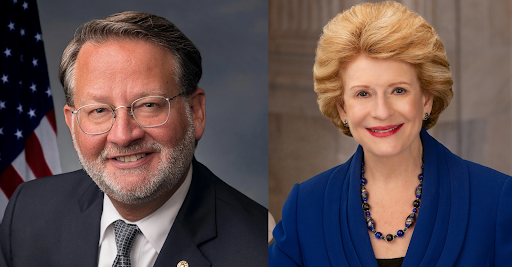-1.png?width=300&name=thumbnail_image001%20(1)-1.png)
Funding Senators Secured Will Allow Hemlock to Expand Production of Hyper-Pure Polysilicon Needed for Semiconductor Chips, Create Thousands of Good-Paying Manufacturing and Construction Jobs in Michigan
WASHINGTON, DC – U.S. Senators Gary Peters (MI) and Debbie Stabenow (MI) announced Hemlock Semiconductor (HSC) will receive up to $325 million in federal funding to build a new, state-of-the-art manufacturing facility on its existing campus in Hemlock, Michigan. The new facility will allow the company to expand production of hyper-pure polysilicon needed to manufacture semiconductor chips, which are used to make a wide variety of products including vehicles, cell phones, washing machines, medical devices, agricultural equipment, solar panels, and defense technologies. The funding comes from the CHIPS and Science Act, legislation Peters and Stabenow helped craft and pass into law to boost U.S. production of semiconductor chips, create American jobs, and strengthen U.S. national security by lessening our dependence on foreign companies for these critical technologies. This investment is expected to create 180 good-paying manufacturing jobs, as well as thousands of construction jobs, in Michigan.
Hemlock Semiconductor (HSC) is the nation’s leading producer of hyper-pure polysilicon for the semiconductor and solar industries and one of only five companies in the world capable of producing the highest quality polysilicon for semiconductor chips.
“In Michigan, our workers know how to make things well and with precision. That’s why I’m thrilled to announce this major investment that is going to keep Michigan at the forefront of advanced manufacturing, nationally and globally, and create thousands of good-paying jobs in our state,” said Senator Peters. “As one of just five companies worldwide and the only company headquartered in the U.S. that produces hyper-pure polysilicon for semiconductors, Hemlock Semiconductor plays a critical role in both our economy and national security. I’m proud to have authored the provision in the CHIPS and Science Act that ensured HSC would be eligible for this grant and have since continued to advocate for HSC as they work to ramp up production here at home. This funding will be a catalyst to that effort.”
“Michigan knows all too well what happens when we are dependent on semiconductor chips made halfway around the world. That’s why, as part of the CHIPS and Science Act, I led the effort with Senator Peters and Representative Kildee to make sure semiconductor chips are manufacturing here in the United States and there is no better place to make them than Michigan. This important federal investment will boost Michigan manufacturing, fix our broken supply chains, lower costs, and bring jobs home,” said Senator Stabenow. “I applaud Hemlock Semiconductor’s leadership in semiconductor manufacturing and improving our supply chains.”
“HSC is proud to be a manufacturing powerhouse for two vital industries of the future—semiconductor and solar. Bolstered by the CHIPS Act, we are planning for a once-in-a-generation investment in advanced technologies to continue serving as a top polysilicon supplier to the leading-edge semiconductor market,” said HSC Chairman and CEO AB Ghosh. “Our customers want high quality and sustainably made polysilicon. This proposed investment demonstrates that the Biden-Harris Administration, Governor Whitmer and our Michigan congressional champions understand HSC’s unique ability to meet those demands and our crucial role in strengthening American interests. As the United States works to reshore critical supply chains, we hope to make additional investments.”
Peters and Stabenow have made strengthening American manufacturing and securing domestic supply chains a top priority. The CHIPS and Science Act includes a provision Peters and Stabenow authored to support the domestic production of mature semiconductor technologies and ensure that projects supporting critical manufacturing industries are given priority status, which would include the automotive sector. This is in addition to $50 billion already in the bill to incentivize U.S. production of all types of semiconductors – for a total of $52 billion. The CHIPS and Science Act also included Peters’ bipartisan Investing in Domestic Semiconductor Manufacturing Act, which ensures federal incentives to boost domestic semiconductor manufacturing include U.S. suppliers that produce the materials and manufacturing equipment that enable semiconductor manufacturing – including HSC. This provision authored by Peters ensured HSC would be eligible for the grant funding announced today. The CHIPS and Science Act additionally authorized increased funding for the [http://about:blank$400,000%20in%20federal%20funding/]Manufacturing Extension Partnership (MEP) program, which has been a priority for Peters and Stabenow.
Last year, the Senate unanimously passed Peters’ bipartisan legislation to strengthen federal efforts to expand domestic manufacturing of semiconductor chips. Peters’ Securing Semiconductor Supply Chains Act would direct the U.S. Department of Commerce’s SelectUSA program, in collaboration with other federal agencies and state economic development organizations, to develop strategies that would attract investment in U.S. semiconductor manufacturers and supply chains.
Peters and Stabenow also helped enact the Bipartisan Infrastructure Law, which includes a provision authored by Stabenow and supported by Peters to strengthen Buy American requirements and close loopholes to ensure the federal government is spending taxpayer dollars on American-made products that support American companies and workers. The law also requires federal infrastructure projects to use domestically produced materials, promotes domestic production of personal protective equipment, directs the creation of a BuyAmerican.gov website, and creates a Made in America Office in the White House. Finally, the law strengthens the Manufacturing Extension Partnership to boost opportunities for small- and medium-sized businesses to sell products to federal agencies. Peters and Stabenow additionally supported and helped pass the Inflation Reduction Act, which will strengthen domestic manufacturing of clean energy technologies, help combat the climate crisis and create millions of American jobs.
###











.png)



